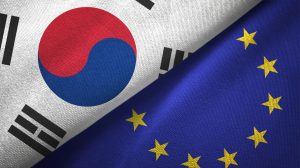South Korea is on the way to joining the world’s largest research organization. This March, after five years of preparation, the East Asian country completed an agreement to enter Horizon Europe as an associate member. Horizon Europe is the European Union’s 95-billion-euro funding program for research and innovation.
Associate member status allows countries like South Korea to both contribute to the fund and have their research entities apply for funding “on equal terms with entities of EU countries.” Alongside South Korea, 19 other countries, including Canada and New Zealand, have also agreed to become associate members, most of them non-EU member states in Europe. In Asia, Singapore and Japan are also in the process of negotiating affiliation.
Europe’s interest in South Korea is unsurprising given the country’s status as a science and technology powerhouse. South Korea ranks second, after Israel, in R&D investment as a proportion of GDP. Science and technology have been considered major tools for the economic and industrial growth that led South Korea from being a colonized and then war-torn country to a successful developed economy. In other words, strategic use of science and technology has been crucial for Korean transformation.
But there is more to the new Europe-South Korea research connection than this background.
Against the backdrop of tension between China and the United States, both South Korea and Europe are keen to find ways to diversify their R&D partners. Science and technology have become a major area of concern between these two giants. Squeezed between a security alliance with the United States and deep economic partnership with China, South Korea has once again found itself a shrimp pressed between two whales. Establishing ties outside of China and the United States could at least lessen this pressure. It is in this context that intensifying collaboration with Europe becomes more attractive.
A second issue is an aspiration in South Korea to shift from traditional strengths in technology to expanding capabilities in basic science. Internal discussions in South Korea highlight that the time has come for Korea to change its science and technology paradigm to not only focus on economic development, but also to pay more attention to basic science and contribute to solving global problems.
South Korea has been an impressive success story in combining science and technology development with economic activity. As one of four “Asian tigers,” in 2021 South Korea was officially recategorized as a developed country by the United Nations Conference on Trade and Development (UNCTAD). This move was remarkable since the U.N. agency had not upgraded a member state’s development status since its establishment of 1964.
Amid this economic success, voices have grown arguing that South Korea should allow its science and technology sector to mature, especially by granting more support and respect to basic science.
In the 2023 Science and Technology Forum, Seoul’s Ambassador for Science and Technology at the Ministry of Foreign Affairs, Shin Sung-chul, emphasized that South Korea should find ways to diversify its global science and technology collaboration partners to incorporate both European and developing countries in a more substantial way. He pointed out that it is good for South Korea to revitalize collaborative research with “countries of basic science,” such as Switzerland, Sweden, and Austria.
Horizon Europe could, therefore, provide resources and connections to help South Korea build its basic science.
These considerations are also tied up in domestic political wrangling. A major been the massive decrease in funding for science and technology. Compared to 2023, the government lowered the R&D budget by 14.7 percent for 2024. This marked the first time that government funds allocated for R&D have declined since 1991. Even during the Asia Financial Crisis of 1997-98, South Korea’s R&D budget grew as a proportion of spending. To explain this shocking decrease, the government claimed that there has been a cartel in the field of science and technology. Yet this was not followed up by any government actions revealing who are the main cartel members and what plans can be followed to dissolve the alleged cartel.
The reduction in R&D funding has raised criticisms that South Korea is going against global conditions. Given geopolitical tensions and the apparent need for countries to expand control of their own technologies, allowing R&D budgets to drop seems hard to justify.
In light of these domestic and global conditions, South Korea’s entry into Horizon Europe could be quite sensible. Horizon Europe focuses on developing knowledge that can contribute to global society. Joining Horizon Europe can open a new chapter for South Korea – or for other Asian countries in the near future.
Horizon Europe’s emphasis on open science means approaches to innovation get shared. This sharing can help the world move to the next level in tackling global problems. Collaboration of this sort can be a step to take science and technology beyond national borders and, more importantly, to enliven conversations about how innovation can improve our world. This means focusing not just on material wealth or national security but also addressing the ethics of science and technology advancement and reaffirming the value of curiosity, both for its own sake and for contributing to society.

































